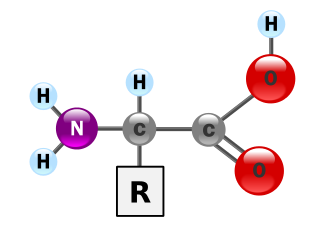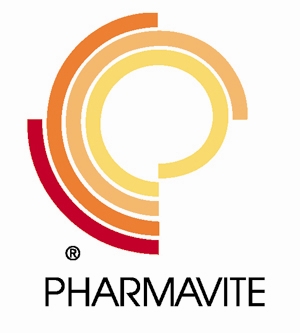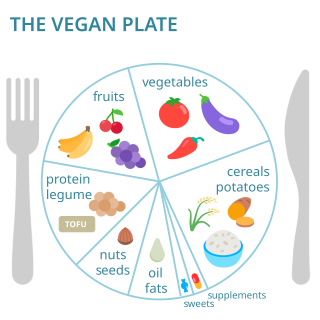Vitamin deficiency is the condition of a long-term lack of a vitamin. When caused by not enough vitamin intake it is classified as a primary deficiency, whereas when due to an underlying disorder such as malabsorption it is called a secondary deficiency. An underlying disorder can have 2 main causes:

A dietary supplement is a manufactured product intended to supplement a person's diet by taking a pill, capsule, tablet, powder, or liquid. A supplement can provide nutrients either extracted from food sources, or that are synthetic. The classes of nutrient compounds in supplements include vitamins, minerals, fiber, fatty acids, and amino acids. Dietary supplements can also contain substances that have not been confirmed as being essential to life, and so are not nutrients per se, but are marketed as having a beneficial biological effect, such as plant pigments or polyphenols. Animals can also be a source of supplement ingredients, such as collagen from chickens or fish for example. These are also sold individually and in combination, and may be combined with nutrient ingredients. The European Commission has also established harmonized rules to help insure that food supplements are safe and appropriately labeled.
In the U.S. and Canada, the Reference Daily Intake (RDI) is used in nutrition labeling on food and dietary supplement products to indicate the daily intake level of a nutrient that is considered to be sufficient to meet the requirements of 97–98% of healthy individuals in every demographic in the United States. While developed for the US population, it has been adopted by other countries, though not universally.
Orthomolecular medicine is a form of alternative medicine that aims to maintain human health through nutritional supplementation. The concept builds on the idea of an optimal nutritional environment in the body and suggests that diseases reflect deficiencies in this environment. Treatment for disease, according to this view, involves attempts to correct "imbalances or deficiencies based on individual biochemistry" by use of substances such as vitamins, minerals, amino acids, trace elements and fatty acids. The notions behind orthomolecular medicine are not supported by sound medical evidence, and the therapy is not effective for chronic disease prevention; even the validity of calling the orthomolecular approach a form of medicine has been questioned since the 1970s.

Calcium ions (Ca2+) contribute to the physiology and biochemistry of organisms' cells. They play an important role in signal transduction pathways, where they act as a second messenger, in neurotransmitter release from neurons, in contraction of all muscle cell types, and in fertilization. Many enzymes require calcium ions as a cofactor, including several of the coagulation factors. Extracellular calcium is also important for maintaining the potential difference across excitable cell membranes, as well as proper bone formation.
B vitamins are a class of water-soluble vitamins that play important roles in cell metabolism and synthesis of red blood cells. They are a chemically diverse class of compounds, but are associated in diet, often occurring together in the same foods. Dietary supplements containing all eight are referred to as a vitamin B complex. Individual B vitamins are referred to by B-number or by chemical name, such as B1 for thiamine, B2 for riboflavin, and B3 for niacin, while some are more commonly recognized by name than by number, such as pantothenic acid (B5), biotin (B7), and folate (B9).
Nutraceutical is a marketing term used to imply a pharmaceutical effect from a compound or food product that has not been scientifically confirmed or approved to have clinical benefits. In the United States, nutraceuticals are unregulated, existing in the same category as dietary supplements and food additives by the Food and Drug Administration (FDA), under the authority of the Federal Food, Drug, and Cosmetic Act.
Bodybuilding supplements are dietary supplements commonly used by those involved in bodybuilding, weightlifting, mixed martial arts, and athletics for the purpose of facilitating an increase in lean body mass. Bodybuilding supplements may contain ingredients that are advertised to increase a person's muscle, body weight, athletic performance, and decrease a person's percent body fat for desired muscle definition. Among the most widely used are high protein drinks, pre-workout blends, branched-chain amino acids (BCAA), glutamine, arginine, essential fatty acids, creatine, HMB, whey protein, ZMA, and weight loss products. Supplements are sold either as single ingredient preparations or in the form of "stacks" – proprietary blends of various supplements marketed as offering synergistic advantages.
The American Nutrition Association (ANA) is a 501(c)(3) charitable non-profit organization established to encourage the scientific investigation of nutrition and metabolism. The ANA publishes the Journal of the American Nutrition Association and hosts scientific conferences in the US and in Europe.
Life Sciences Research Organization (LSRO) is a non-profit organization based in Maryland, United States, that specializes in assembling "ad hoc" expert panels to evaluate scientific literature, data, systems, and proposals in the biomedical sciences.

Alkaline diet describes a group of loosely related diets based on the misconception that different types of food can have an effect on the pH balance of the body. It originated from the acid ash hypothesis, which primarily related to osteoporosis research. Proponents of the diet believe that certain foods can affect the acidity (pH) of the body and that the change in pH can therefore be used to treat or prevent disease. However, their claims are false, and there is no evidence supporting the claimed mechanisms of this diet, which is not recommended by dietitians or other health professionals.

Proteins are essential nutrients for the human body. They are one of the building blocks of body tissue and can also serve as a fuel source. As a fuel, proteins provide as much energy density as carbohydrates: 4 kcal per gram; in contrast, lipids provide 9 kcal per gram. The most important aspect and defining characteristic of protein from a nutritional standpoint is its amino acid composition.

Femarelle is a dietary supplement that is a mixture of DT56a and flaxseed powder, that may act as a selective estrogen receptor modulator (SERM). In 2008 an application was submitted to the European Food Safety Authority to market Femarelle with a health claim, namely that it can reduce the risk for osteoporosis and other bone disorders; the EFSA found that "the food/constituent for which the claim is made, i.e. Femarelle, has not been sufficiently characterised" and that " a cause and effect relationship has not been established between the consumption of Femarelle and increased BMD, increased bone formation, or decreased risk of osteoporosis or other bone disorders in post-menopausal women."

Vitamin D is a group of fat-soluble secosteroids responsible for increasing intestinal absorption of calcium, magnesium, and phosphate, and for many other biological effects. In humans, the most important compounds in this group are vitamin D3 (cholecalciferol) and vitamin D2 (ergocalciferol).
Nutrients is an open access peer-reviewed scientific journal publishing reviews, regular research papers, and short communications on all aspects of nutrition. It was established in 2009 and is published by MDPI.

Pharmavite is an American vitamin and supplement company, based in West Hills, California and founded in 1971 by Barry Pressman and Henry Burdick. Its Nature Made vitamin brand was launched that same year. It was acquired by Otsuka Pharmaceutical in 1989.

Vegan nutrition refers to the nutritional and human health aspects of vegan diets. A well-planned, balanced vegan diet is suitable to meet all recommendations for nutrients in every stage of human life. Vegan diets tend to be higher in dietary fiber, magnesium, folic acid, vitamin C, vitamin E, iron, and phytochemicals; and lower in calories, saturated fat, cholesterol, long-chain omega-3 fatty acids, vitamin D, calcium, zinc, and vitamin B12.
A bioactive compound is a compound that has an effect on a living organism, tissue or cell, usually demonstrated by basic research in vitro or in vivo in the laboratory. While dietary nutrients are essential to life, bioactive compounds have not been proved to be essential – as the body can function without them – or because their actions are obscured by nutrients fulfilling the function.
The acid-ash hypothesis is a medical hypothesis which suggests that excessively acidic diets may result in a number of identifiable health effects, including an increased risk of osteoporosis. It has received some attention in the lay community, and has been used to support the diet known as the Alkaline diet. According to the hypothesis, acid ash is produced by meat, poultry, cheese, fish, eggs, and grains. Alkaline ash is produced by fruits and vegetables, except cranberries, prunes and plums. Since the acid or alkaline ash designation is based on the residue left on combustion rather than the acidity of the food, foods such as citrus fruits that are generally considered acidic are actually considered alkaline producing in this diet.

Johanna T. Dwyer is an American nutrition scientist and dietitian. She is a senior scientist at the National Institutes of Health's Office of Dietary Supplements and director of the Frances Stern Nutrition Center at Tufts Medical Center. Dwyer is a professor of nutrition at the Friedman School of Nutrition Science and Policy.









